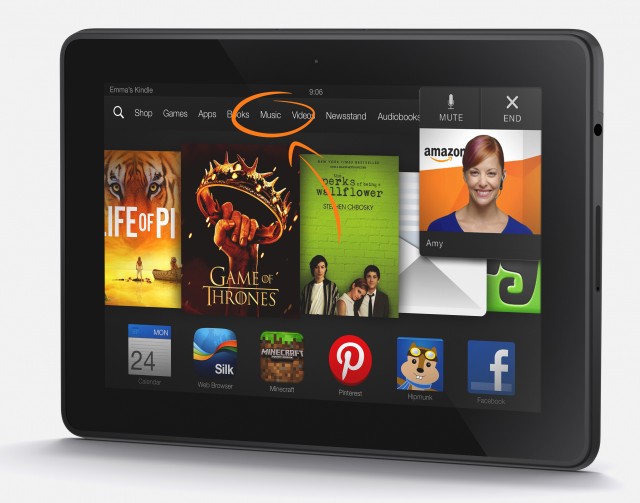
The Financial Times is reporting that Amazon and HTC are teaming up to develop a "range" of smartphones. The timeline is fuzzy at this point, with the report saying that the devices are unlikely to launch this year. Despite one phone supposedly being "at an advanced stage of development," The Financial Times says that Amazon might not release the device at all.
Still, if the report pans out, this will be the second time HTC has helped a company jump into the smartphone market. It previously built the HTC First, the flagship phone for the launch of Facebook Home, an Android home replacement. The smartphone company is surely hoping its fortunes will be better this time, as the "Facebook Phone" was a massive flop, selling only 15,000 units.
But the huge difference between the two initiatives is that the HTC First was an Android device and shipped with the Google Apps. Presumably, the Amazon phone would run a version of the Kindle OS, an Android fork that ships without the Play Store and the rest of Google's apps.
An HTC partnership with Amazon would be extremely surprising. Building a device that runs a fork of Android is something that HTC is expressly forbidden from doing as per its membership in the Open Handset Alliance (OHA), Google's cabal of Android Google app licensees. Members get access to the Play Store, Gmail, Google Maps, and all the other Google apps for Android. OHA members commit to building one Android platform—Google's platform—and not shipping devices that run forks of Android.
We saw Google's response to a situation like this before when Acer tried to ship a device running a non-Google-approved version of Android—Alibaba's Aliyun OS. When Google got wind of it, Acer was told to shut the project down or lose its access to Google Apps. Google even made a whole blog post about the ordeal, saying:
While Android remains free for anyone to use as they would like, only Android compatible devices benefit from the full Android ecosystem. By joining the Open Handset Alliance, each member contributes to and builds one Android platform—not a bunch of incompatible versions.
Historically, it appears that shipping one non-Google device will get you kicked out of the Google ecosystem. So if Amazon's phone makes it to market and doesn't run a Google-approved version of Android, HTC could be banned from future access to Google apps.
Google's grip over the entire smartphone ecosystem is why none of the usual names build Amazon's Kindle Fire line of tablets. OHA members can't ship Android forks, meaning Acer, Asus, Dell, Foxconn, Fujitsu, HTC, Huawei, Kyocera, Lenovo, LG, Motorola, NEC, Samsung, Sharp, Sony, Toshiba, and ZTE have not built any Amazon devices. This leaves the Kindle Fires in the hands of Quanta Computer, a company primarily known for making laptops.
While the plans clearly aren't concrete at this point, HTC and Amazon would need to figure out how to ship these devices without getting HTC expelled from Google's Android ecosystem. Amazon's devices are meant to encourage users to use Amazon's services; it's hard to imagine the company shipping an Android device full of competing services from Google, but that's what HTC's OHA membership requires. We'll be eagerly awaiting Google's response to all this with a bowl of popcorn at the ready.
If Google's level of control over a seemingly open source project is news to you, the rabbit hole goes much deeper. We'll be addressing just how hard life outside of the Google ecosystem is in a feature due out early next week.
reader comments
106